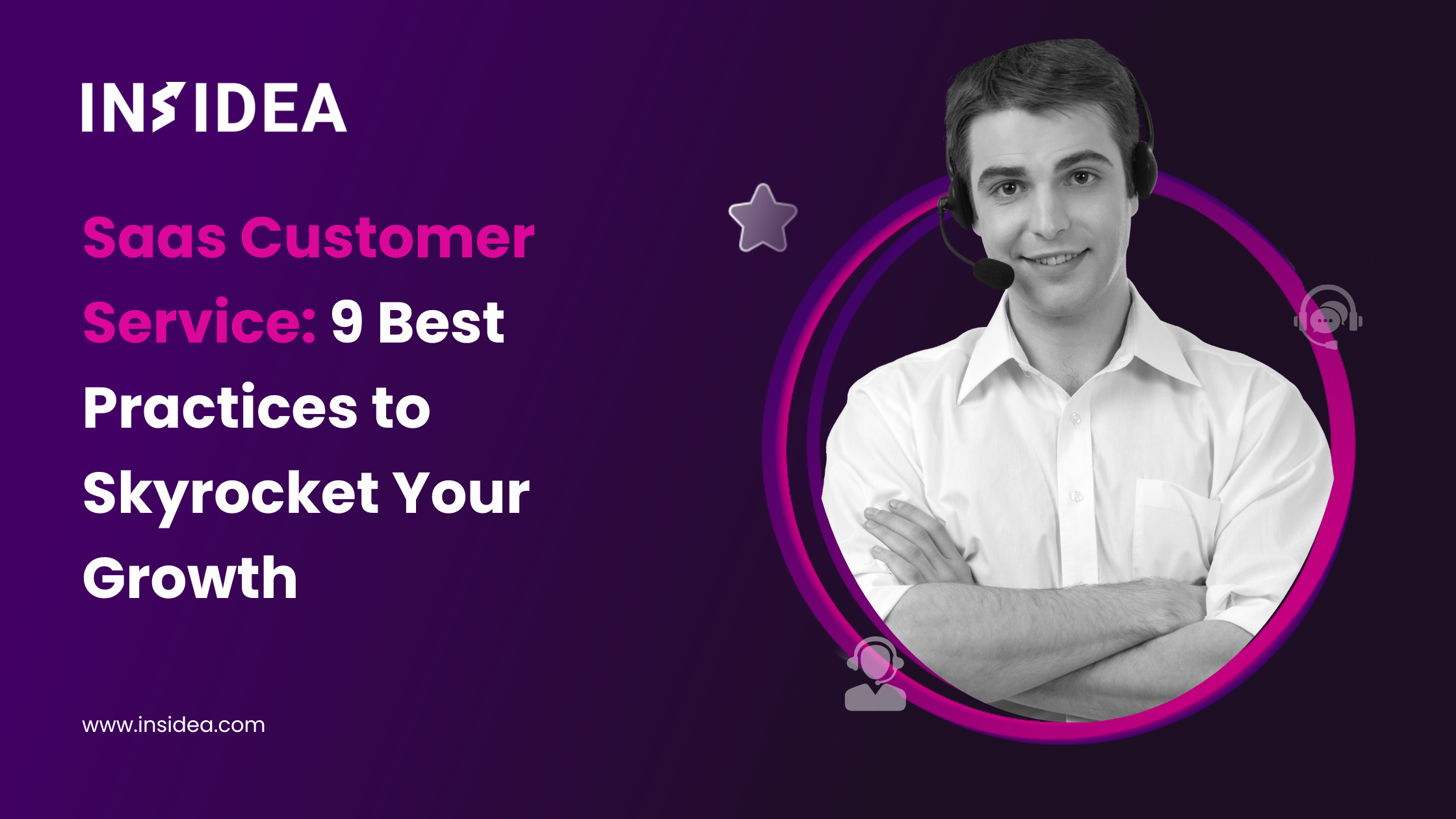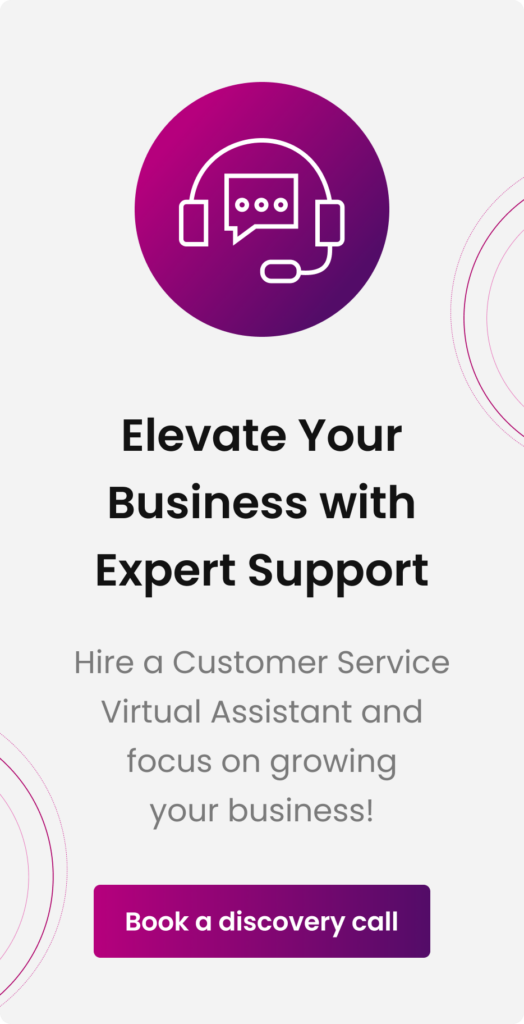As a SaaS company, providing top-notch customer support ensures customer satisfaction and long-term success. However, setting up an effective support strategy can be challenging, especially if you need a background in customer support.
Providing exceptional customer experiences plays a pivotal role in boosting customer retention rates. In the current economic landscape, retaining customers is crucial for sustaining a profitable business. Studies have shown that even a slight increase in customer retention, as little as 5%, can lead to a significant profit increase, often exceeding 25%.
This blog will walk you through a set of SaaS customer service best practices that can turn your customers into brand advocates helping you deliver exceptional support to your valued customers.
Defining SaaS Customer Support
SaaS customer support involves assisting customers throughout their journey with your product before and after the sale. It entails providing answers to their questions, resolving issues, and helping them achieve success with your software. Your support team may also be responsible for educating customers through webinars, knowledge base documentation, and other educational resources.
The Importance of Saas Customer Service for Businesses
Customer support is vital in understanding your customers’ sentiments towards your business. It is an early indicator of customer satisfaction and provides valuable insights for your product and engineering teams. Moreover, your support team represents your brand, making it crucial to deliver exceptional service that aligns with your mission and values. A positive reputation can significantly impact customer retention, a critical factor in the SaaS industry with its monthly subscriptions and high churn rates.
The Critical Components of a Great SaaS Customer Service Strategy
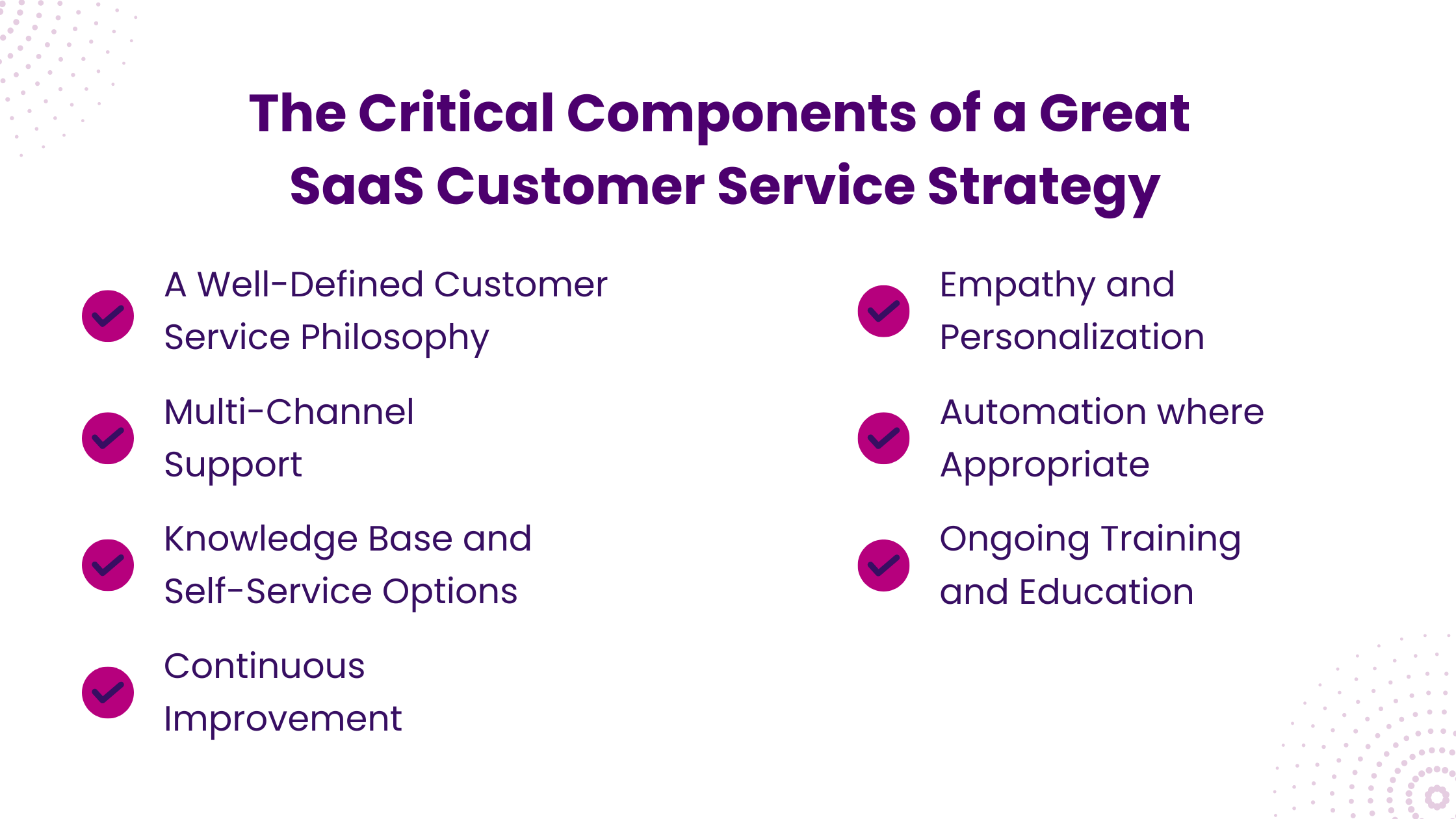
While hiring caring individuals is important for long-term success, other key components contribute to an effective support strategy. Here are some critical elements to consider:
1. A Well-Defined Customer Service Philosophy
Start by defining clear goals that align with your customer’s needs and expectations. Answer questions such as:
- How do your values translate into your support strategy?
- What tone and language should your team use?
- How can you differentiate yourself from competitors in terms of product and support?
- How will you handle customer escalations and disagreements?
- Which support channels will you offer (email, self-service, phone, social media, live chat)?
- How will you measure and ensure service quality?
- How would you like customers to describe the service you provide?
These answers will shape your ideal customer service strategy and guide the development of your support system.
2. Multi-Channel Support
Offering support through various channels (email, phone, chat, social media) allows customers to choose their preferred method of communication. Ensure prompt responses and consistent service quality across all channels.
3. Knowledge Base and Self-Service Options
Develop a comprehensive knowledge base and self-service resources that empower customers to find answers independently. Regularly update these resources to address common questions and provide step-by-step guides.
4. Continuous Improvement
Regularly gather customer feedback and use it to identify areas for improvement. Monitor response times, resolution rates, and customer satisfaction metrics. Actively involve your support team in product planning discussions to leverage their insights.
5. Empathy and Personalization
Train your support team to be empathetic listeners and problem solvers. Encourage them to personalize interactions by using customers’ names and addressing their concerns.
6. Automation where Appropriate
Utilize automation tools to streamline routine tasks like ticket routing and status updates. However, ensure that a human touch is always available for more complex issues.
7. Ongoing Training and Education
Invest in continuous training for your support team to update them on product changes and industry trends. Encourage ongoing learning and provide resources for professional development.
By implementing these best practices, you can build a robust SaaS customer support strategy that enhances customer satisfaction, fosters loyalty, and drives long-term success for your business.
Remember, exceptional customer support is not just a nice-to-have; it’s a fundamental pillar of a thriving SaaS company that values its customers’ success.
9 SaaS Customer Service Best Practices That Set you up for Success
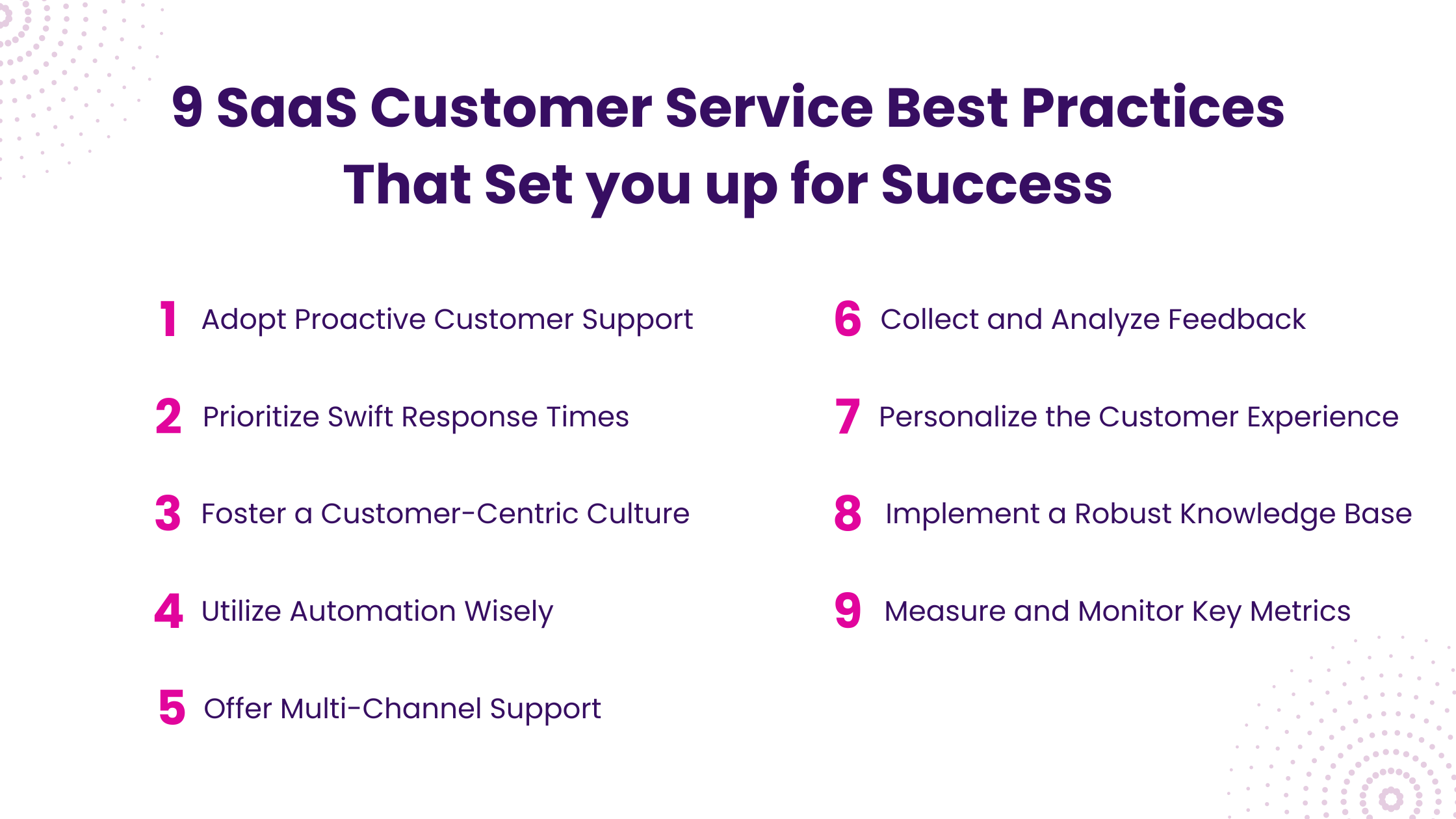
We all know that customer service has become the cornerstone of success for SaaS companies. Meeting customer expectations and providing exceptional support can be the differentiator that sets your SaaS offering apart from the rest.
To excel in this arena, you need to employ a set of SaaS customer service best practices that can turn your customers into brand advocates. Below, we will explore nine key strategies to elevate your SaaS customer service.
1. Adopt Proactive Customer Support
Proactivity is the golden ticket to providing exceptional SaaS customer service. Instead of merely reacting to customer issues, take a proactive stance. This means anticipating potential problems and addressing them before they become critical. Utilize user data, analytics, and feedback to identify pain points or areas where users might struggle. Develop resources like FAQs, video tutorials, and knowledge bases to answer common questions preemptively.
Proactive support also involves reaching out to customers before they contact you. Send personalized emails with tips, updates, and relevant content to enhance their user experience. You’ll resolve issues faster and build stronger customer relationships by demonstrating your commitment to their success. Here’s how you can go about it:
- Anticipate customer needs based on data and feedback.
- Create comprehensive FAQs and knowledge bases.
- Send personalized emails with helpful tips and updates.
- Implement proactive chatbots for instant assistance.
- Develop video tutorials to guide users through everyday tasks.
2. Prioritize Swift Response Times
Customers expect quick resolutions to their inquiries. To meet these expectations, invest in a responsive support team. Implement live chat, chatbots, or AI-driven ticketing systems to ensure customers receive assistance promptly.
Additionally, establish clear service level agreements for issue resolution times. Train your support agents to prioritize urgent requests and maintain an efficient triage system. Swift responses boost customer satisfaction, reduce churn rates, and increase customer retention. Here are a few strategies to help you accomplish this:
- Set clear service level agreements (SLAs) for issue resolution.
- Utilize live chat for real-time customer support.
- Implement AI-driven ticketing systems to streamline responses.
- Train support agents to prioritize urgent requests.
- Monitor response times and continuously improve efficiency.
3. Foster a Customer-Centric Culture
Customer service should be embedded in your SaaS company’s DNA. Encourage all employees, not just the support team, to prioritize customer satisfaction. Foster a culture where every employee understands the importance of delivering an exceptional customer experience.
Hold regular training sessions to educate your team about customer service best practices and the nuances of your product. Encourage open communication channels between departments to ensure customer feedback is disseminated and acted upon effectively. Here are a few strategies in this regard:
- Educate all your employees on the importance of customer satisfaction.
- Conduct regular customer service training sessions.
- Encourage cross-departmental communication for feedback sharing.
- Reward employees who go above and beyond for customers.
- Establish a company-wide commitment to delivering exceptional service.
4. Utilize Automation Wisely
Automation can be a powerful ally in delivering efficient SaaS customer service. However, it should complement human support, only replace it partially. Use chatbots and automated responses for handling routine inquiries and directing customers to relevant resources.
Automating repetitive tasks frees your support agents to focus on more complex issues requiring human expertise. Just remember to strike a balance, as over-reliance on automation can lead to a lack of personal touch, which is crucial in customer service. Here’s what you can do:
- Use chatbots to handle routine inquiries and FAQs.
- Automate follow-up emails for issue resolution updates.
- Implement automated ticket routing for efficient triage.
- Ensure a seamless transition from bots to human support when needed.
- Regularly review and update automated responses for accuracy.
5. Offer Multi-Channel Support
Modern customers have diverse preferences when it comes to communication. Some prefer email, while others prefer live chat or social media. To cater to a wide audience, provide multi-channel support options. This ensures that customers can reach out through their preferred platform.
However, it’s essential to maintain consistency across all channels. Train your support team to uphold the same standards of professionalism and knowledge, regardless of the communication channel used. Implementing a unified ticketing system can help streamline customer interactions across various channels.
- Provide customer support through email, live chat, phone, and social media.
- Ensure consistency in professionalism and knowledge across all channels.
- Integrate a unified ticketing system for centralized communication.
- Enable self-service options through a customer portal.
- Monitor and promptly respond to customer inquiries on various platforms.
6. Collect and Analyze Feedback
Customer feedback is a goldmine of insights that can improve your SaaS customer service. Actively solicit customer feedback through surveys, emails, or post-interaction forms. Pay attention to both positive and negative feedback.
Analyzing customer feedback can reveal recurring issues or pain points that need attention. Implement a structured feedback loop within your organization to ensure that feedback is collected and acted upon. When customers see that their input leads to positive changes, it enhances their perception of your company. Here’s how:
- Actively solicit feedback through surveys and post-interaction forms.
- Categorize and analyze feedback to identify recurring issues.
- Implement a structured feedback loop within the organization.
- Share customer feedback with relevant departments for action.
- Showcase improvements made based on customer input.
7. Personalize the Customer Experience
Customers expect tailored experiences. Leverage customer data and insights to personalize interactions. Address customers by name, recommend features or content based on their usage patterns, and acknowledge their unique needs.
Personalization goes beyond just addressing the customer by name; it’s about understanding their preferences, pain points, and goals. Use this knowledge to provide relevant solutions and suggestions, making customers feel valued and understood. Here are a few ways to achieve this:
- Address customers by their names in communications.
- Recommend features and content based on user preferences.
- Tailor responses to individual needs and challenges.
- Use data to provide relevant solutions and suggestions.
- Make customers feel valued and understood through personalization.
8. Implement a Robust Knowledge Base
A well-structured knowledge base is an invaluable asset for customers and support teams. It serves as a self-help resource for users and reduces the volume of routine queries, allowing support agents to focus on more complex issues.
Ensure your knowledge base is up-to-date, easy to navigate, and comprehensive. Include articles, tutorials, troubleshooting guides, and FAQs that cater to different user levels. Regularly update it to address new features, updates, and common user issues. These practices will help you:
- Create a well-organized knowledge base with easy navigation.
- Include articles, tutorials, troubleshooting guides, and FAQs.
- Keep content up-to-date to address new features and updates.
- Encourage users to explore self-help resources.
- Reduce the volume of routine queries with comprehensive information.
9. Measure and Monitor Key Metrics
You must rely on data-driven metrics to gauge the effectiveness of your SaaS customer service efforts. Track key performance indicators (KPIs) such as customer satisfaction (CSAT) scores, Net Promoter Score (NPS), and customer retention rates.
Use these metrics to identify areas that require improvement and set clear, achievable goals for your support team. Review performance data and adjust your strategies to enhance the customer experience. Here’s how you can go about it:
- Track customer satisfaction (CSAT) scores to assess happiness.
- Monitor Net Promoter Score (NPS) for customer loyalty.
- Analyze customer retention rates for long-term success indicators.
- Set clear goals for your support team based on performance data.
- Continuously review and adjust strategies to enhance the customer experience.
You can implement These customer service best practices in your business and improve client satisfaction. However, if you are facing any implementation challenges, we are here to help. Contact INSIDEA, and let’s strengthen your business’s customer experience together.
Examples Of Saas Companies With Great Customer Support
There are several SaaS companies known for providing exceptional customer support. Here are a few examples:
1. Zendesk
Zendesk is a customer service and engagement platform that offers a range of support solutions. They are renowned for their customer-centric approach, providing 24/7 support across multiple channels. Zendesk prioritizes personalized interactions, self-service options, and continuous improvement based on customer feedback.
2. HubSpot
HubSpot is an all-in-one marketing, sales, and customer service platform. They are known for their customer-centric approach and have built a reputation for exceptional support. HubSpot offers various support channels, including live chat, phone support, and a comprehensive knowledge base. They also provide extensive educational resources and certifications to empower customers.
3. Intercom
Intercom is a customer messaging platform that focuses on personalized communication and proactive support. They provide real-time chat support, as well as in-app messaging and email support. Intercom’s support team is highly regarded for their expertise, responsiveness, and ability to provide tailored solutions to customers.
4. Salesforce
Salesforce is a leading CRM platform that places a strong emphasis on customer success. They offer comprehensive support resources, including a robust knowledge base, community forums, and personalized support options. Salesforce’s support team is known for their expertise and commitment to helping customers achieve their goals.
These are just a few examples of SaaS companies that have established a reputation for delivering exceptional customer support. Each company prioritizes customer satisfaction, offers multi-channel support, and invests in continuous improvement to provide the best possible experience for their customers.
Unlock Customer Service Excellence with INSIDEA’s Expertise!
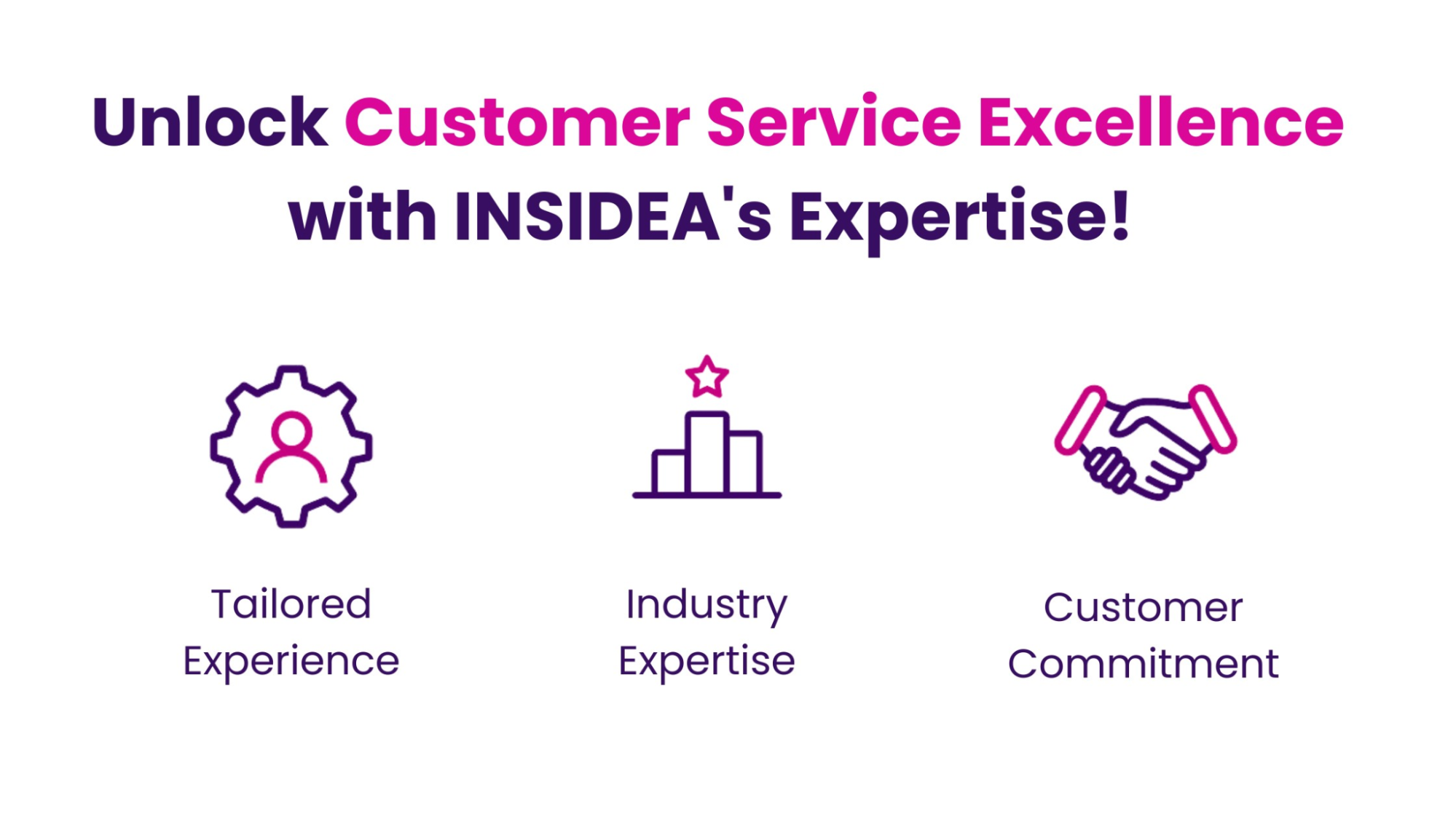
Effective customer support in SaaS businesses is more than just a necessity; it’s a significant value driver. Done well, it can boost the bottom line, improve customer retention, accelerate product development, and enhance adoption. Excellent support plays a crucial role in guiding customers through the buying process and can be the deciding factor in a competitive market. Developing a solid support strategy, choosing the right tools, staffing a capable team, understanding customer needs, and tracking progress are key. Drawing inspiration from successful companies can further refine your support strategy, turning it into a powerful asset for your business.
Are you ready to transform your customer service and take your customer experience to the next level? INSIDEA is here to guide you through every step of the way, ensuring that your support team is empowered to deliver exceptional service.
As experts in outsourcing customer support solutions, we pride ourselves on helping businesses optimize their support strategies for maximum efficiency and customer satisfaction. Reach out today to discover how INSIDEA can revolutionize your customer support and contribute to your business success!
Tailored Support Strategies: At INSIDEA, we understand that every business is unique. That’s why we work closely with you to develop customized support strategies that align with your specific needs and goals.
Industry Expertise: Our team brings a wealth of experience and industry knowledge to the table, ensuring that you have access to the best practices and insights in customer support.
Customer Commitment : Your customers’ happiness is our top priority. We are dedicated to helping you exceed their expectations and foster long-lasting relationships.
Ready to elevate your customer support experience? Book a meeting with our experts today and start your journey towards outstanding customer service and satisfaction.




